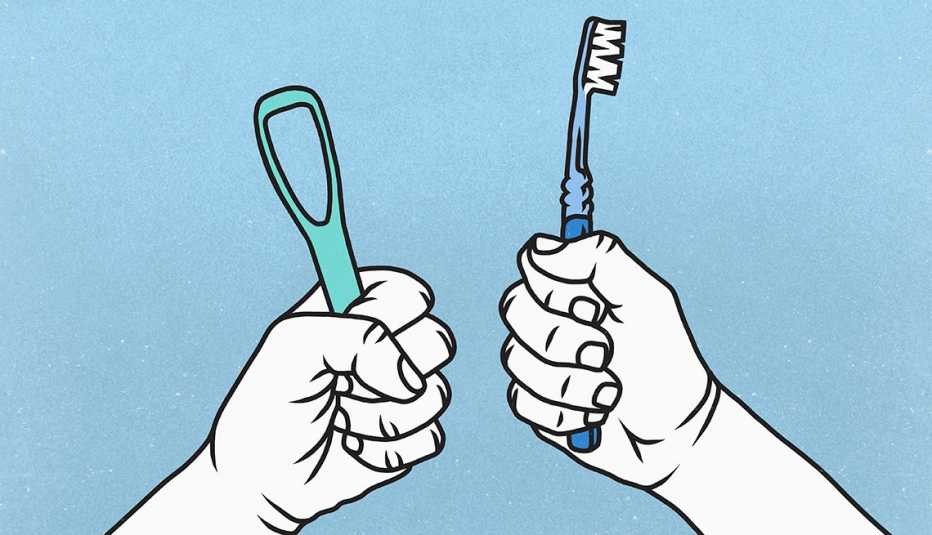Staying Fit


There are many myths about aging, and the idea that you need to slow down or slack off on healthy habits is one of them. In fact, there are a number of things that you can do once you hit 50 — or 60 or 70 — that can have a big impact on your health and increase your odds of living longer.
Here are eight habits to pick up (or drop) at 50-plus.
1. Keep your social calendar full
Are you spending too much time alone? Believe it or not, loneliness can have a big impact on our mental and physical health, and older adults are especially at risk because many lose touch with family and friends due to moves, physical limitations or deaths.


AARP Membership— $12 for your first year when you sign up for Automatic Renewal
Get instant access to members-only products and hundreds of discounts, a free second membership, and a subscription to AARP the Magazine.
Social isolation has been linked to everything from heart disease and diabetes to cognitive decline and more. A recent advisory from the U.S. Surgeon General reports that social disconnection can shorten lives by about as much as smoking 15 cigarettes a day.
Looking for a few ways to keep in the mix as you age?
- Stay in touch with family and friends. If you can’t be there in person, stay connected with voice and video calls. AARP has tutorials for those who need technical assistance. Your local library may also be able to help.
- Volunteer. Research shows that volunteering has both physical and mental benefits for older adults. A 2020 study from researchers at Harvard’s T.H. Chan School of Public Health found that older adults who volunteer for as little as two hours per week can significantly reduce their risks of premature death. If a faith-based organization interests you, find one in your community where you can engage in activities and meet others.
- Learn something new. Many public and private organizations offer low-cost classes (think woodworking, music lessons, dancing, etc.) for older adults. Not only is picking up a new hobby good for your social life, but research shows it can also be a boon for your brain.
- Consider adopting a pet. Studies suggest owning a pet can help older adults stay physically active and even help them retain thinking and memory skills. Just be sure to pick a pet that matches your lifestyle. For example, if you are rarely at home or have trouble getting out for walks, a cat might be a better fit than a dog.
2. Get your eyes and ears checked
You’re in the habit of going to your primary care provider for your annual checkup — but don’t forget about your vision and hearing, which also need special attention as you get older.
A big reason: People who have trouble hearing and don’t get it corrected are more likely to develop dementia. What’s more, vision loss can increase your risk of falls, along with a host of other health issues, according to the Centers for Disease Control and Prevention (CDC).
Help Someone Else Live Longer
Learning CPR won’t help prolong your life, but it could help someone else.
Performing CPR is easy and now is “hands only” — without “mouth-to-mouth” breathing assistance. If someone is not responsive and not breathing: Call 911 (or instruct someone else to). Then kneel by the side of the person in trouble, place your hands on their breastbone (center of the chest) and press down hard and fast — aim for 100 to 120 compressions a minute. Keep going until the professionals arrive.
Clues that you may be experiencing hearing loss include needing to turn up the TV volume or having trouble understanding conversations when there is background noise. Some causes may be reversible (like an ear infection or a buildup of earwax), but generally it’s just the body’s aging process.
If you find that you’re having trouble hearing, talk to your primary care provider; they may refer you to an audiologist or otolaryngologist (ear, nose and throat doctor). Many people find they need hearing aids, which these days can be purchased over the counter. (Visit AARP’s Hearing Center for more information.)
Vision loss is also common as we age and can be due to cataracts (when the lens of the eye is clouded) or age-related macular degeneration (disease of the macula, which is part of your eye’s retina).
If you are over 65, you should have your eyes checked every one to two years by an optometrist or ophthalmologist. Unless you have certain medical conditions, original Medicare does not cover routine eye exams, glasses or contact lenses, but many Medicare Advantage plans and other insurers do.




































































More on Health
What Men Wish Their Doctors Told Them About Turning 50
5 health changes you might not expect and what to do about them
6 Things Women Wish Their Doctors Told Them About Turning 50
Here are some of the big changes you should expect and what you can do about each oneYour Weight In Your 50s: What It Means for Your Health
What those extra pounds really mean to our health and longevity — and how to deal with them effectively